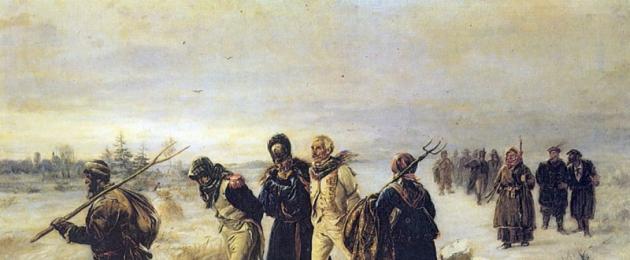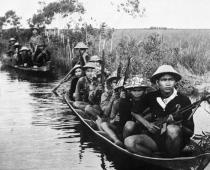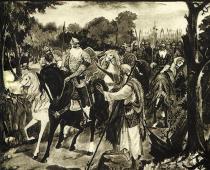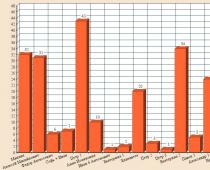The War of 1812 (sometimes called the First Patriotic War) is one of the most iconic in Russian history. For a long time, she was considered the standard of manifestation of patriotism and heroism. And besides, all its participants received in the end not what they expected and what they deserved.
The last step to conquer the world
This is how Napoleon himself assessed his attack on Russia (he did not perceive the Western Hemisphere as part of the world). But the megalomania of the emperor of the French was only in words; in fact, he was quite pragmatic and did not start the war without good reasons:
- Systematic violations by Russia of the continental blockade of England, to which she undertook to join under the Treaty of Tilsit.
- The desire to put an end to the numerous anti-French coalitions in which Russia was a participant.
- The desire to expand the zone of its direct influence in Europe at the expense of the former lands of the Commonwealth, which after its division went to Russia.
- To ensure the possibility of a subsequent attack on India (for some reason, all the great conquerors of modern and recent times were sure that England could not live without this colony).
As you can see, Russia, without directly starting the war, openly provoked it. Russian troops have already fought against Napoleon, and in 1805-1807, when he did not make any claims to Russia.
Scorched Earth, Borodin Day and General Frost
The Patriotic War of 1812 began on June 12 (24), at night, when the Napoleonic troops began crossing the Neman. The first stage of the war was unsuccessful for the Russian army. Although it was only slightly outnumbered by the French (a little over 400,000 Russians against a little less than 600,000 French), General Foul's defense plan was no good.
Nevertheless, the army retreated with battles. The most significant were the battles near Saltanovka (11 (23) July) and (4-6 (16-18) August). Napoleon acted not only in the central (main) direction, but significant events did not happen in other areas. A huge achievement during the first stage of the war was the use of an officially unappreciated invention - the scorched earth tactics. Other military leaders reproached him for retreating (it almost came to obstruction), but Barclay's tactics turned out to be correct in the end.
On August 17 (29) the army was received by a new commander-in-chief -. On August 26-27 (September 7-8), the legendary battle of Borodino took place, but after it Kutuzov continued Barclay's tactics and retreated. On September 1 (13), a council was held in Fili, at which it was decided to leave Moscow.
This decision cost the capital a fire. But the army got the opportunity to arm itself at the expense of the Tula factories and receive reinforcements. The Tarutino maneuver made it possible to disorientate the enemy, who remained in devastated Moscow without reinforcements and supplies.
Napoleon made attempts to make peace, but Russia no longer needed it. In October, the French army was forced to withdraw from Moscow. The autumn turned out to be cold, the frost was dangerous for southerners who were not accustomed to the cold.

Napoleon expected to leave along the Kaluga road, but the battle near Maloyaroslavets (October 24) deprived him of this opportunity, and the army retreated along the "scorched earth" of the Smolensk road. In addition to Russian regular units, she was annoyed by Cossacks and partisans from among ordinary residents and the military (in 1812, the idea of an organized and led by the state was born, so successfully applied in the Great Patriotic War).
Many consider the end of the war (November 25-27). But in fact, only on December 30 did all French troops leave Russia. Officially, the victory was celebrated on Christmas Day.
Winning with a trick
The result of the war was actually a turning point in the course of the Napoleonic wars. The great commander lost almost all the best fighters in Russia (including a significant part of the guard). In the Europe he conquered, a movement against the French began, and Prussia and Austria, which he defeated (which together with Russia and England formed a new anti-French coalition), became more active.
The war contributed to the unity of Russian society, the rise of the national idea. Class interests were less significant. The events of the war have long been used for educational purposes. Its participants became an ideal for future servicemen.
But there was also a downside. Many officers were convinced that life in the country of the "usurper and invader" is much more reasonable than in Russia. They remained patriots, but now love for the Motherland called them to Senate Square...
- In contact with 0
- Google Plus 0
- OK 0
- Facebook 0








